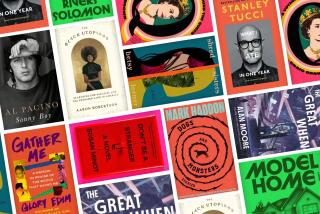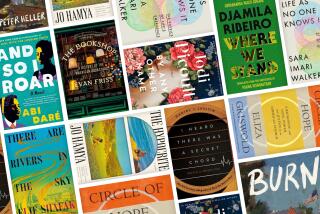Discoveries
Mr. Dynamite
A Novel
Meredith Brosnan
Dalkey Archive Press:
176 pp., $13.50 paper
*
âWho would have dreamt that a ... European intellectual like myself could find solace ... in the violent rhymes and rhythms pumping out of the projects and back alleys of [New York]?â And who would have dreamt that a novel mouthed by a demented, enraged, unemployed animator with a âprojectâ titled âThe Troubles in the Northâ inspired by an orange with green mold on it -- a novel reading like a desperate want ad -- could be this irksomely entertaining? After Jarleth Prendergast, ex-Irishman awaiting an inheritance, begins an edgy correspondence with Sean Reynolds, the solicitor who will dispense it, Reynolds is killed by a car. But Jarleth continues to bare his soul to Sean even as his case goes to a new lawyer, who tells him thereâs a mistake and he will get a teapot instead of cash. Jarleth tells Sean (up in solicitor heaven) about his marriage to a raving vegetarian and about a new love abused by her stepfather, whom Jarleth vows to kill though the girl ditched him. Heâs kicked out by the wife, uses up his friendsâ goodwill, loses his job at a copy shop and now has only a searing desire to kill his sweetheartâs abuser. Why not go home to Ireland? Because of a curse a witch placed on him: âIâll be changed into a superannuated moaning undead THING all drool puss cankers and brittle bones ... screaming trapped in my rotting fleshy envelope till judgment break.... â Thatâs why. This is writing so fast and funny you canât break free no matter how much youâd like to reenter the civilized world.
*
What Is History Now?
Edited by David Cannadine
Palgrave/Macmillan:
256 pp., $19.95 paper
*
And now for something completely different. In 1961, that grand old man of British history E.H. Carr wrote a book called âWhat Is History?â It rapidly became a classic, inspiring drastic change in the way historians pursued their craft. Carr, a journalist and diplomat as well as a history professor, was interested in why things happened, not just in chronicling what happened. To him, historians were not empty vessels but people with interests and biases. He also wanted to fling open the gates to study places, like Russia and China, beyond the standard European fare. In the 1980s, historians took a different turn, away from narrative and interpretation toward such things as gender studies and family history, only to return in the 1990s to narrative and more anthropological approaches. In this volume, historians look at the effect of Carrâs book on their work and the changes in their fields since it was written. The jargonâs still there but it seems harmless, almost charming; phrases like âPanglossianismâ and âseminal-cum-perennialâ give that lovely, visiting-another-planet feel to what could have been a dusty book. Like a telescope, it sharpens our view of history, even our take on the news.
*
Donât Let the Sun Step Over You
A White Mountain Apache
Family Life, 1860-1975
Eva Tulene Watt with assistance from Keith H. Basso
The University of Arizona Press:
332 pp., $50
*
I devour these all too infrequent narratives of long-ago Native American lives -- infrequent because they require hours of taping, transcribing, researching and vast knowledge of native dialects, ritual and religion. In 1997, anthropologist Keith Basso began taping the stories of Eva Watt, a White Mountain Apache woman born in 1913 who grew up on reservations in Arizona. Her voice is a pleasure to listen to -- kind, observant, with a this-too-shall-pass quality, seeming almost practical at times and not just because it tells you how to find a good grinding stone or cure everything from pneumonia to lightning burns. The warning not to let the sun step over you refers to the Apache habit of not dwelling on misfortune. â[W]hen I think about those days,â Watt says, âthe people down there and all they used to do -- itâs like going somewhere good.â
More to Read
Sign up for our Book Club newsletter
Get the latest news, events and more from the Los Angeles Times Book Club, and help us get L.A. reading and talking.
You may occasionally receive promotional content from the Los Angeles Times.







